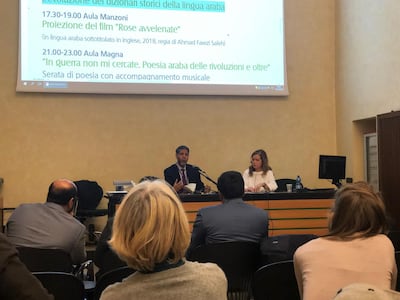Sharjah is compiling a landmark historical record charting 17 centuries of development in the Arabic language.
The Historical Dictionary of the Arabic Language will look at how the world's fifth most widely spoken language, as well as Arab culture, has grown.
News of the project was set out at the Arabic Language and Culture Festival in Milan by Dr Mohamed Safi Al Mosteghanemi, secretary general of Sharjah's Arabic Language Academy.
He said the book is already coming together under the direction of Dr Sheikh Sultan bin Muhammad Al Qasimi, Supreme Council Member and Ruler of Sharjah, and "will mark a new era for the Arabic language lexicon".
The scholar described the dictionary as a "great work", representing the collective memory of the Arab world and documents its news, literature and history, UAE news agency Wam reported.
Similar projects have been undertaken but never completed given the scale of the project, he said.
"The project was resumed after receiving the Sharjah Ruler’s directives, and is nearing completion. The dictionary will be published soon," he said.
Its contents will chronicle Arabic language and culture from the past 17 centuries in three research stages – old inscriptions, the Semitic branch of languages with a focus on Arabic, as well as the practical use of the language. It will encompass five ages: pre-Islamic, Islamic (Umayyad and Abbasid), separatist dynasties, the Mamluk Sultanate, and modern history.
More than 300 senior Arabic researchers and linguists, editors and experts divided into nine committees in nine countries are working on the creation of the dictionary, and that the editing committee sits at the Union of Arab Scientific Language Academies’ premises in Cairo, Egypt.
The Emirate of Sharjah has participated at the fourth edition of the Arabic Language and Culture Festival in Milan. The festival is organised by the Catholic University of the Sacred Heart, UNICATT, in a partnership with Sharjah Book Authority.
"There are many dictionaries in the Arab world, but none as comprehensive as this one, which documents the history and evolution of all Arabic words," Dr Al Mosteghanemi told an audience.
"This project faced challenges, especially those that were related to its massive scale. The historian or linguist cannot build on specific references and leave others. They should not include books on literature and its genres and ignore books on philosophy, history and other sciences."
"The Germans were among the first to write a comprehensive historical dictionary. The Deutsches Worterbuch project was begun by the Brothers Grimm in 1838, but was stalled due to their deaths. The dictionary was finally completed about 120 years later by a succession of later scholars and institutions in 1961," he added.
He said the project entails the development of a Digital Language Registry along with the physical dictionary.
Abdullah Hassan Al Shamsi, UAE's Consul-General in Milan, said that the project does more than just chart the development of one language.
"Our participation comes from our intent to correct confusions and misinterpretations about a foreign culture, especially internationally, which lead to the marginalisation of the role and impact of these cultures," he said.
Each year, the Arabic Language and Culture Festival celebrates the contributions of Arab culture. The fourth edition of the festival has brought together key Arab writers, researchers and historians, shedding light on the vital role of Arab women writers and scholar in the enhancement of human culture.


